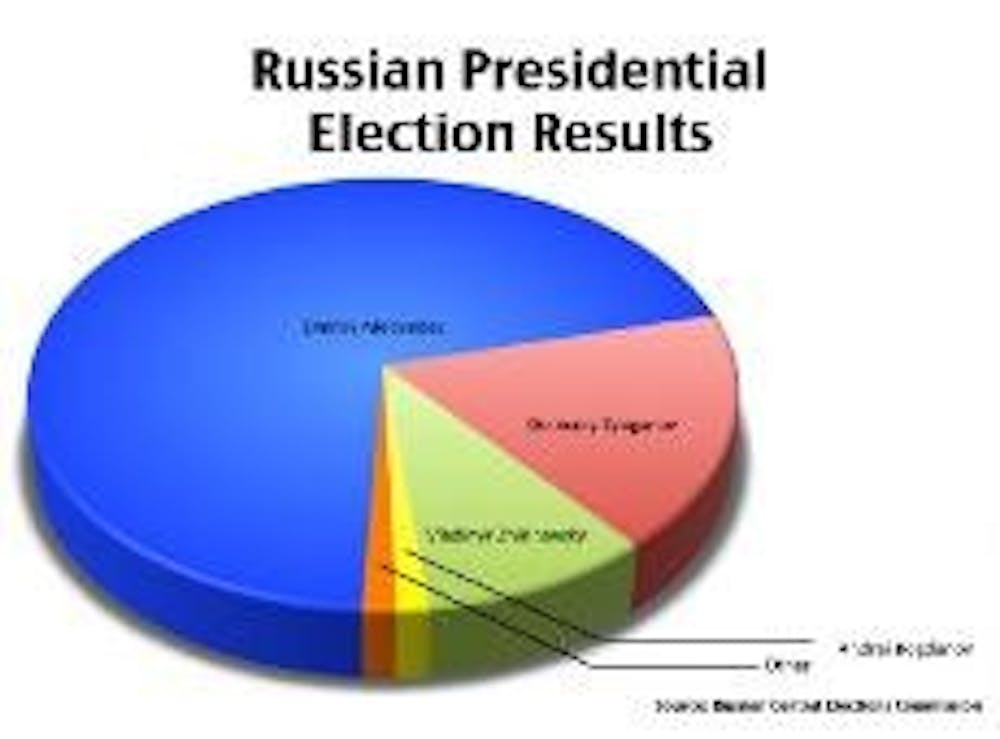
A recent meeting between German Chancellor Angela Merkel and Russian President-elect Dmitry Medvedev of Russia spawned little hope in the mind of the German leader. Following the meeting in Moscow, Merkel told reporters, "I think there will be continuity. I do not think that the controversies will just disappear." Indeed, vocal statements by both President Vladimir Putin and Medvedev that the former will remain a strong influence-at least for a time-in Russian policy makes it difficult to be hopeful for any drastic policy change. Still, given this monarchic transition, it is prudent to look at the signs for what may happen in the future.
There is no doubt that the infamous Putin will remain a driving force behind Kremlin policy, probably from the post of prime minister. However, there are some signs to indicate Medvedev may be less of a puppet than many expect. For example, Putin has hinted several times that he would maintain control of Russia's foreign policy and given his obvious skill in this area-coupled with Medvedev's strong economic background-such a construct is not an absurd idea. Yet, recently Medvedev stated that he would maintain control over Russian foreign policy, as has been the prerogative of the post of president since 1993. Whether the presidency retains this competency or whether its policy-making powers are transferred to the prime minister-ship, Putin will maintain a strong amount of influence over Russian strategy. If Medvedev retains these constitutional powers, then it will be a major statement by the new president that he does not expect Putin's influence to remain eternally involved.
Furthermore, Putin himself has actually left the door open for Medvedev to alter Kremlin policy once he is officially sworn in as president May 7. Interestingly, in the area of granting presidential pardons, Putin has stated that such acts will remain a competency of the head of state. This means that should he so choose, Medvedev could actually pardon oil magnate Mikhail Khodorkovsky-a Russian oligarch that has been imprisoned on tax fraud and evasion charges since 2003. Khodorkovsky was largely viewed as a last major threat to Kremlin primacy and his imprisonment ended the oligarch's ability to provide regional opposition to the Kremlin administration. If Medvedev were to pardon Khodorkovsky, it would signal an interesting departure from the paranoid, power-thirsty years of the Putin administration and would be a significant step in the right direction for Russian democratic development.
Finally, in picking Medvedev, Putin has brought to the fore a young man whose soft-spoken manner is a drastic shift from the tradition of KGB "manly-men" who have long been perceived as necessary to lead the great Russian nation. Medvedev was certainly a Kremlin compromise between the highly powerful siloviki (former KGB and military men) and the more liberal economic wing. If Medvedev is able to demonstrate to this cohort that an outsider can competently lead the nation without weakening its international standing, he would be in prime position to gently begin liberalizing the Russian government.
In the short run, any major change in the status quo is highly unlikely. The Kremlin's influential security and defense arm will be skeptical of Medvedev for a while. If the new president is able to maintain control of the competencies of the president and to successfully work with the former president to allay the fears of the siloviki, he will be in a strong position for liberal action (beginning in the economic sector). Medvedev's soft-spoken style may actually aid him in accomplishing these tasks. Just as Putin surged forward to consolidate power at a critical time, perhaps Medvedev will do the same for Russian democracy.





